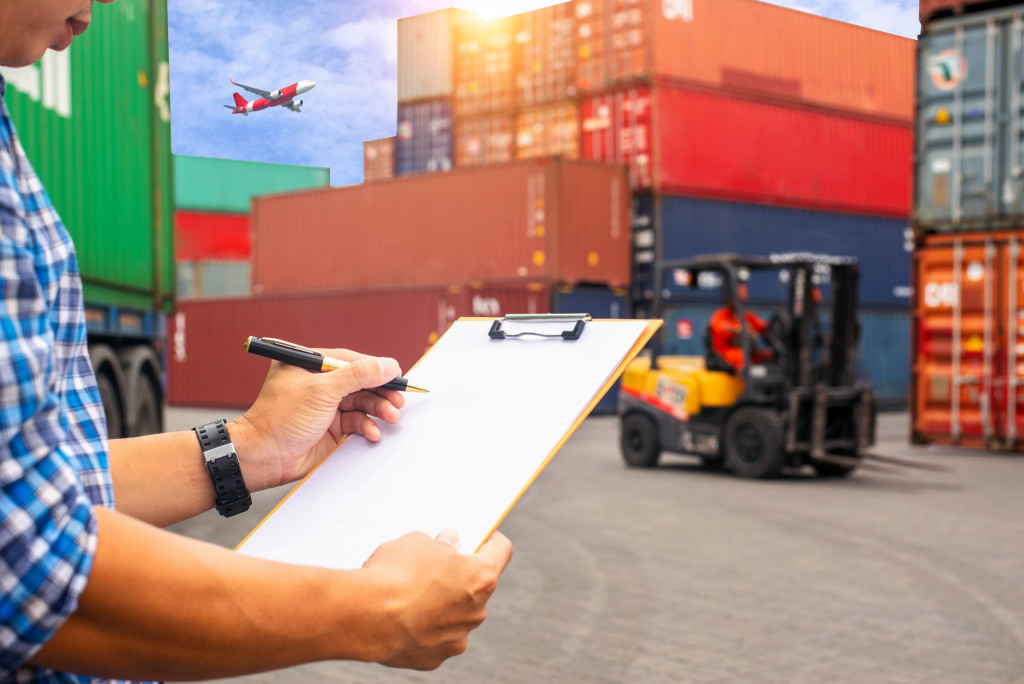• GPS shipment tracking allows companies to accurately estimate arrival times and reduce costs.
• Robotics and automation technology can be used for inventory management, order filling, and other tasks.
• Blockchain is a secure solution that allows stakeholders to access updated information without relying on third-party verification.
• Utilizing AI-powered solutions will help your business streamline its processes and make data-driven decisions.
• IoT enables businesses to track shipments in real-time, analyze traffic patterns, gain operational visibility, and predict delays.
For those in the logistics industry, technology is revolutionizing how business is conducted. With advanced technologies, like GPS shipment tracking and blockchain, companies can track shipments with greater accuracy and efficiency than ever before. Here are a few of the most innovative technologies that are revolutionizing the logistics industry as you know it.
GPS Shipment Tracking
GPS shipment tracking (Global Positioning System) is a technology used by logistics companies to monitor and track their shipments in real time. GPS tracking systems utilize satellite technology to pinpoint the exact location of a shipment at any given time. This allows companies to accurately estimate arrival times, plan routes more efficiently, and reduce costs associated with fuel, labor, and other factors.
Robotics and Automation Technology

Robotics and automation technology have become increasingly popular in the logistics industry over the past few years. Automated robots are able to quickly move packages from one location to another with incredible accuracy and speed, eliminating human error from the equation.
Additionally, robots can be used for inventory management, order filling, sorting tasks, loading/unloading pallets onto trucks or airplanes, and more—allowing businesses to streamline their processes even further.
Robots also ensure that warehouse operations run smoothly during peak hours when there may not be enough human workers available to do all of the necessary tasks. This helps prevent delays in shipments or customer orders, which can result in lost revenue for companies in the long run.
Blockchain Technology
Blockchain is a distributed ledger technology (DLT) that has been gaining traction in many industries – including logistics – over the past few years due to its ability to securely store data without requiring third-party verification or authentication.
With blockchain-powered solutions like smart contracts, companies can easily track shipments as they move through different stages of delivery without having to worry about errors or disputes arising from incorrect data being shared between parties involved in the transaction process.
Additionally, blockchain’s distributed nature ensures that all stakeholders can access updated information on a secure platform without having to rely on a centralized authority such as banks or governments for validation purposes. This makes it an ideal solution for global shipping operations where multiple parties must be kept informed at all times.
Artificial Intelligence (AI)
Artificial intelligence is already making significant strides in the logistics industry, allowing companies to conduct automated operations with greater accuracy and efficiency than ever before. AI-powered solutions like robotics can be used for complex tasks such as sorting and packing goods, while more advanced AI-driven decision-making systems can help businesses optimize their processes by analyzing data and making suggestions for improvements.
Internet of Things (IoT)

The Internet of Things (IoT) enables businesses in the logistics industry to track their shipments in real-time and gain more significant insights into how they are managed. With IoT, data can be collected from sensors along a shipment’s route and used to do the following:
Monitor performance
Companies can monitor the performance of their shipments and take corrective action if needed. This allows them to reduce delays and ensure that customers receive their products as quickly as possible.
Analyze traffic patterns
IoT can be used to analyze traffic patterns and other relevant data so that businesses can adjust their delivery routes accordingly. This helps them save time, money, and resources – resulting in a more efficient operation.
Increase operational visibility
IoT-powered sensors can provide companies with real-time insights into their operations, allowing them to make data-driven decisions and reduce operational costs.
Predict delays
Using predictive analytics, businesses can anticipate potential delays in their shipments and take the necessary steps to prevent them from happening. This increases customer satisfaction and helps companies maintain a good reputation.
By leveraging IoT, you can gain a better understanding of your shipment operations and ensure that they are running as efficiently as possible.
The logistics industry is rapidly changing, and technologies such as GPS shipment tracking, robotics and automation technology, blockchain technology, artificial intelligence (AI), and the Internet of Things (IoT) are revolutionizing business. By leveraging these innovative solutions, companies can gain real-time insights into their operations, which will help them reduce delays in shipments or customer orders while increasing operational visibility.
In this way, they can save time, money, and resources resulting in a more efficient operation that keeps customers satisfied. Investing in new technologies for your company’s logistics processes may seem daunting, but it could be well worth the effort – especially if you want to stay competitive with other businesses in the market!
